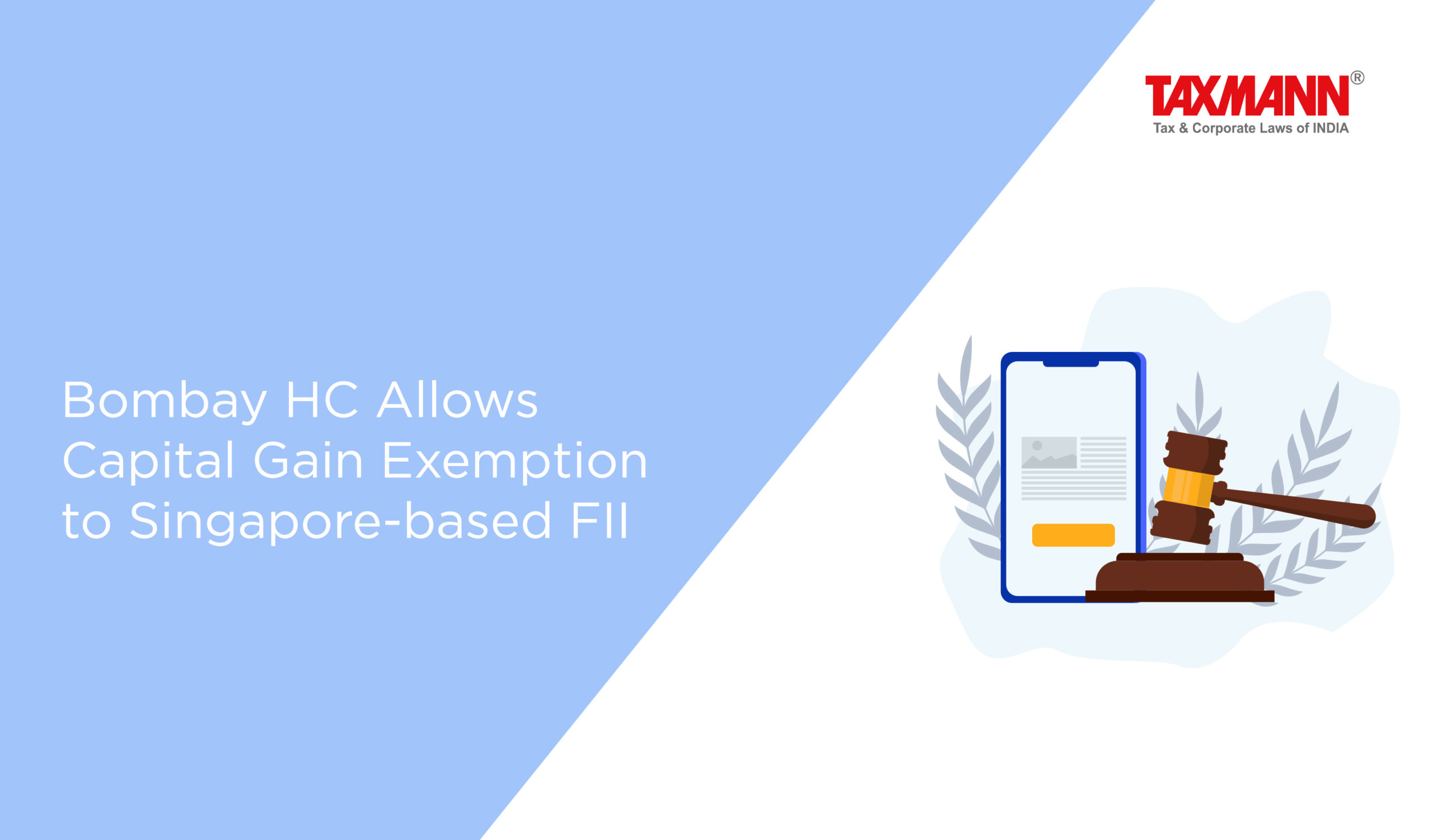Bombay HC Allows Capital Gain Exemption to Singapore-based FII
- Blog|News|Income Tax|
- 2 Min Read
- By Taxmann
- |
- Last Updated on 29 June, 2023

Case Details: Commissioner of Income-tax Vs. Citicorp Investment Bank - [2023] 151 taxmann.com 501 (Bombay)
Judiciary and Counsel Details
-
- K.R. Shriram & Firdosh P Pooniwalla, JJ.
- Devvrat Singh for the Appellant.
- P.J. Pardiwalla, Sr. Adv. & B.D. Damobar for the Respondent.
Facts of the Case
Assessee, a tax resident of Singapore, registered as a Foreign Institutional Investor (FII) in the debt segment with the Securities and Exchange Board of India (SEBI). During the year under consideration, the assessee declared capital gains on the sale of debt instruments and claimed exemption under Article 13(4) of the India-Singapore Double Taxation Avoidance Agreement (DTAA).
During the assessment proceedings, the Assessing Officer (AO) invoked Article 24, contending that though the provisions of Article 13(4) allow exemption of capital gains in the source country, i.e., India, provisions of Article 24 of DTAA provides for restriction of exemption of such capital gains to the extent of repatriation of such income to other country, i.e., Singapore.
In response, the assessee furnished a certificate from Singapore Authorities confirming the assessee’s taxation in Singapore. Unsatisfied, AO made additions to the assessee’s income by denying the exemption.
The Dispute Resolution Panel (DRP) upheld the AO’s order which the Mumbai Tribunal reversed. Accordingly, an appeal was filed by the AO before the Bombay High Court.
High Court Held
The High Court held the assessee would come under Article 13(4) of DTAA, which says gains from the alienation of any property (debt instrument in this case) shall be taxable only in Singapore, of which the alienator (the assessee) is a resident. Thus, the entire capital gain shall be taxed in Singapore.
Applying Article 24, if income from sources in India is exempted from or taxed at a reduced rate in India, and if under Singapore’s current laws, the capital gain is taxed based on the remitted or received amount in Singapore rather than the full amount, then the tax exemption or reduction of tax allowed under DTAA in India will apply only to the portion of income that is remitted to or received in Singapore.
When under the laws in force in Singapore, the income is subject to tax by reference to the full amount thereof, whether or not remitted to or received in Singapore, then in that case, Article 24(1) would not apply.
In the instant case, Singapore authorities have themselves certified that the capital gain income would be brought to tax in Singapore without reference to the amount remitted or received in Singapore. Such certificates issued by the Singapore Tax Authorities will constitute sufficient evidence for accepting the legal position.
Therefore, the entire capital gain shall be taxed in Singapore as per Article 13 without invoking Article 24 of the Tax Treaty.
Disclaimer: The content/information published on the website is only for general information of the user and shall not be construed as legal advice. While the Taxmann has exercised reasonable efforts to ensure the veracity of information/content published, Taxmann shall be under no liability in any manner whatsoever for incorrect information, if any.

Taxmann Publications has a dedicated in-house Research & Editorial Team. This team consists of a team of Chartered Accountants, Company Secretaries, and Lawyers. This team works under the guidance and supervision of editor-in-chief Mr Rakesh Bhargava.
The Research and Editorial Team is responsible for developing reliable and accurate content for the readers. The team follows the six-sigma approach to achieve the benchmark of zero error in its publications and research platforms. The team ensures that the following publication guidelines are thoroughly followed while developing the content:
- The statutory material is obtained only from the authorized and reliable sources
- All the latest developments in the judicial and legislative fields are covered
- Prepare the analytical write-ups on current, controversial, and important issues to help the readers to understand the concept and its implications
- Every content published by Taxmann is complete, accurate and lucid
- All evidence-based statements are supported with proper reference to Section, Circular No., Notification No. or citations
- The golden rules of grammar, style and consistency are thoroughly followed
- Font and size that’s easy to read and remain consistent across all imprint and digital publications are applied



 CA | CS | CMA
CA | CS | CMA
